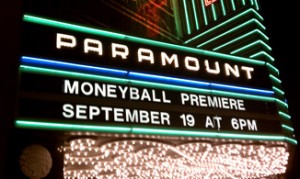 Last weekend, Moneyball, adapted from Michael Lewis' book about Oakland A's GM Billy Beane's early adoption of statistical analysis, was No. 2 at the box office, surpassed only by the re-release of The Lion King. The film also has a 94% rating on Rotten Tomatoes, the fifth-best rated movie on the entire site.
Last weekend, Moneyball, adapted from Michael Lewis' book about Oakland A's GM Billy Beane's early adoption of statistical analysis, was No. 2 at the box office, surpassed only by the re-release of The Lion King. The film also has a 94% rating on Rotten Tomatoes, the fifth-best rated movie on the entire site.
Last week I interviewed Rachael Horovitz, the Moneyball producer who was on the project from the start. Below is an edited transcript. (Disclaimer: We knew each other in grade school. But that was before her movie career was in full swing.)
Talk about your role on the movie...
The project originated with me. I had been a studio executive for a long time and I quit to make my own movies. When you're an executive, you have one boss, one buyer, and if that guy doesn't want to do your idea, you can't go anywhere else. So there were movies that I didn't get to make that I really wanted to.
So I quit and had a two-week vacation, and this book was one of the books I read during that time. It totally jump-started my producing career. I thought this is exactly the kind of movie I want to make, and I'll just keep pounding the pavement until I can get someone to back me.
Sony loved the pitch. They were fans of the book but they hadn't considered it as a movie until we started talking. Warner Bros also responded but I ended up with Sony. The thing about the project that's been so extraordinary -- everyone who's gotten involved has fallen in love with it, and we're all very different people.
I'm going to be thinking about it for a long time, what is it that all of these very different people love about the story. Everyone I know who has read the book has fallen in love with it. And everyone who read it to get involved with the film felt very personally connected to it.
At first blush, when you read the book, you might not necessarily detect a narrative you can extrapolate that would play on-screen. Tell me what you saw in the book that could translate into a compelling movie...
I saw first of all a real movie character in Billy Beane, and that to me is almost always where it starts when I'm looking at a movie -- do you want to spend two hours with this person? I felt that his predicament was extremely human and relatable. None of us on the filmmaking side has worked in baseball, but we all completely related to the predicament. Scenes like Billy trying to decide whether to go to Stanford or to the Mets, I saw those in movie images.
It's been reported that the film took a long time to bring to the screen. Why is that?
Good screenwriting looks easy, but it is damn hard. I've worked on two kinds of movies over the years –- movies that are total auteur, like from [directors] Alexander Payne or Wes Anderson, and ones that are quote, "within the system." A Wes Anderson story, for instance, always starts in Wes' brain. The types of films that are made from within the system, there are committees, and they usually doesn't have a filmmaker from Day 1.
I would often watch my father [playwright Israel Horovitz] get hired onto movies, and they were harder to write than movies or plays that started in his head, because there were other people who had a vote.
But the reason that this particular book was difficult to adapt is because you want to somehow recreate the experience of reading the book, which goes in and out of time, explanation of sabermetrics, and a lot of the historical context. It was a harder script to get down than most.
Did you get to work with Billy Beane?
We worked with him throughout the process. The whole A's organization was supportive of getting the details right. As far as the facts of Billy's life, he was always available for us to ask questions.
Why was Paul DePodesta's name and character changed?
He opted to do that so we respectfully changed his name. I can't tell you exactly why; there's a nice interview with him online where he talks about it. I never met him so I don't know first-hand. I think everybody should have the right to do that.
How did having an esteemed playwright for a father influence you?
Too much. It 's something I'm very aware of now, thinking how did I end up in the movie business. Being a parent, I just see the ways you influence your kids without being aware. Growing up in my house, it was all about movies and plays and that was the emphasis.
So do you have regrets that you wound up in the movie business?
If I could start over I'd go to medical school. But that's just being in your 40s. ..
You can watch clips from Moneyball at Yahoo! Movies.
Related:
- At the Moneyball Premiere... (News Fix)